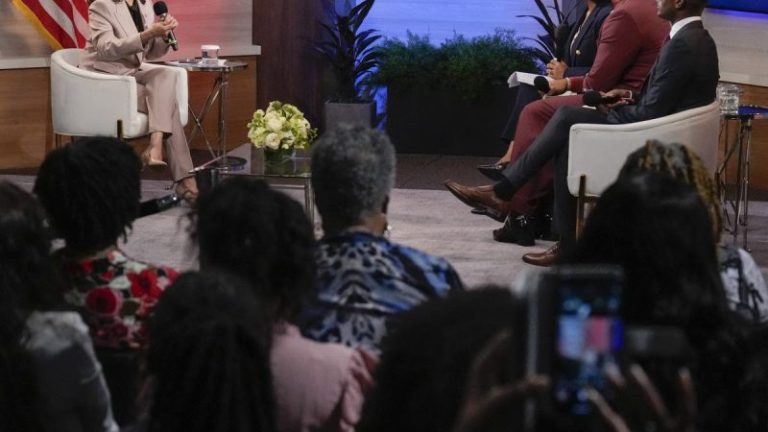Vice President Harris spoke to the National Association of Black Journalists (NABJ) in Philadelphia on Tuesday, about a month after former President Trump spoke to the same group and made waves when he questioned Harris’ race.
The event marks Harris’ first solo interview with the national media. It was held at NPR’s Philadelphia station, WHYY, and was moderated by three Black journalists, including Eugene Daniels of Politico Playbook, WHYY’s Tonya Mosely and TheGrio’s Gerren Keith Gaynor. The stop marked Harris’ 13th visit to the Keystone State this year.
During his July interview with the NABJ in Chicago, Trump drummed up a firestorm of criticism when he said, ‘I didn’t know she was Black until a number of years ago, when she happened to turn Black, and now she wants to be known as Black. So, I don’t know. Is she Indian or Black?’
Harris was not asked to respond to those remarks from Trump on Tuesday, but she did slam the former president for what the moderators described as racially charged rhetoric about Haitian migrants in a small Ohio town eating people’s pets.
‘It’s harmful, and it’s hateful and grounded in some age-old stuff that we should not have the tolerance for,’ Harris said of the rumors being circulated by Trump. ‘We’ve got to say that you cannot be entrusted with standing behind the seal of the president of the United States of America, engaging in that hateful rhetoric that, as usual, is designed to divide us as a country.’
When asked by one of the moderators if this case of ‘irredeemable racism’ deserved some sort of federal response to help the community heal, Harris sidestepped the question.
Meanwhile, Harris also sidestepped whether she would sign or veto a bill establishing a federal committee to study reparations for the Black community. Harris said she ‘thinks’ a federal reparations commission will be taken up by Congress and, therefore, she won’t need to use her power as president to study the matter at the federal level.
Harris also spoke about the Black vote on Tuesday and took a far different approach than President Biden did in 2020.
‘If you have a problem figuring out whether you’re for me or Trump, then you ain’t Black,’ Biden said while campaigning for the presidency in 2020. Harris, however, said Tuesday that she expects to have to ‘earn’ the Black vote, particularly Black men. ‘I think it’s very important to not operate from the assumption that Black men are in anybody’s pocket.’
Beyond race-focused topics, the interview included remarks from Harris about her economic plan, abortion, support for Israel – which she said has the right to defend itself – and gun control.
‘The United Sates of America absolutely has a role’ in aiding Israel’s right to self-determination, Harris said during Tuesday’s interview.
On gun control, Harris was resolute that she and her running mate, Democrat Minnesota Gov. Tim Walz, are both gun owners – something that came as news to voters during last week’s presidential debate. ‘We’re not trying to take anybody’s guns away from them, but we do need an assault weapons ban,’ she said. Previously, as a presidential candidate in 2019, Harris said she thought a mandatory gun buyback program run by the federal government was ‘a good idea.’ However, Harris’ campaign has said she no longer supports such a program.
Harris added that she does support universal background checks for those seeking to legally obtain a firearm. When one of the moderators pointed out that most handguns are purchased illegally, Harris pointed to the need to eradicate ‘gun show loophole[s].’
‘We need to address each entry point in the issue,’ Harris insisted.
Later, the moderators turned to the second assassination attempt made on Trump’s life over the weekend. Harris indicated that she spoke to Trump after the close call to check on him.
‘I am in this election, in this race, for many reasons, including to fight for our democracy. And in a democracy, there is no place for political violence,’ Harris said. ‘We can and should have healthy debates and discussion and disagreements but not resort to violence to resolve those issues.’
Harris was asked a follow-up question about her confidence in the Secret Service to protect her, with Harris responding in the affirmative.
‘Not everybody has Secret Service. And there are far too many people in our country right now who are not feeling safe,’ she said. ‘I mean, I look at Project 2025, and I look at, you know, the Don’t Say Gay laws coming out of Florida. Members of the LGBTQ community don’t feel safe right now, immigrants or people with an immigrant background don’t feel safe right now. Women don’t feel safe right now. And so, yes, I feel safe. I have Secret Service protection, but that doesn’t change my perspective on the importance of fighting for the safety of everybody in our country.’



